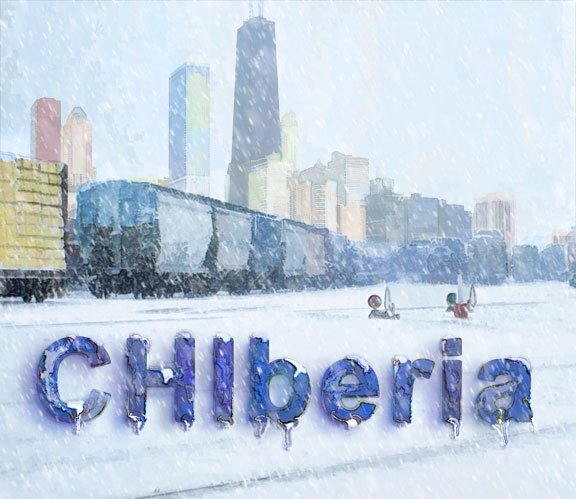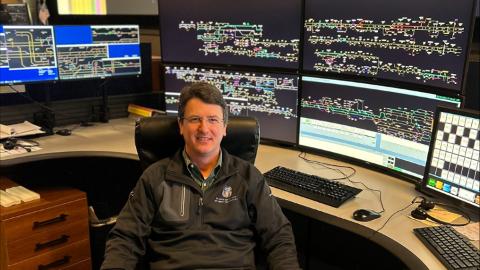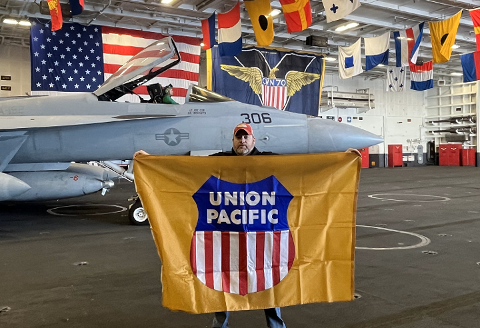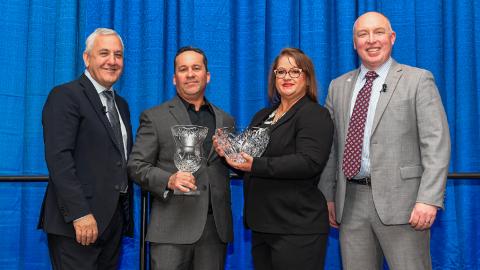Ski goggles? Check. Full-face ski mask? Check. Thermal insulated gloves, cleats and coat over coat over coat? Check, check, check.
No, this is not an equipment check for a polar explorer. It's the protective garb worn by Union Pacific's Chicago-area employees during last year's insane winter cold snap – fondly referred to as "CHIberia."
In addition to protective gear, people throughout Chicagoland have last year's winter to thank for being prepared for harsh weather this year and beyond. The area was pummeled with more snow, colder temperatures and icier conditions than anyone wants to see again.
"Last year's heavy snowfall and very cold temperatures were taxing on our employees and equipment, but people from all departments worked as a team to overcome the inclement weather," said Douglas Garton, director-transportation services, who has worked 20 years for UP in the Chicago area.
Just how inclement? Try:
- 30-below-zero wind chills that froze solid switches, which control the destination of trains.
- Snow drifts to the height of locomotive platforms.
- Vehicles and locomotives that wouldn’t start.
- Crews who could not get to their trains through closed roads.
But employees worked around the clock to ensure CHIberia’s rail operations didn’t come to a standstill, no matter how harsh conditions became.
“In terms of the amount of snow and the awful cold, last year’s winter was the worst I’ve seen on the railroad, and that’s almost 20 years. It impeded people getting to work and made train movements difficult to accomplish."
Dean Ridder, manager of terminal operations in Rochelle, Illinois
"In addition to the bitter cold, the problem for us was blowing snow," said Dean Ridder, manager of terminal operations in Rochelle, Illinois. "There are more than 50 switches between Rochelle and Chicago, and once we got them cleaned out, they’d fill right back up with snow again."
Even the heated blowers, which are designed to keep switches clear of ice and snow, couldn't keep up, he said.
"In terms of the amount of snow and the awful cold, last year's winter was the worst I've seen on the railroad, and that’s almost 20 years," Ridder said. "It impeded people getting to work and made train movements difficult to accomplish."
Just after the snow began to melt and people began putting away their coats, hats and scarves, Union Pacific began thinking about next year.
"We knew we had to do something different, so preparations for this winter began last summer," Garton said. "We went back and looked at our action plans to identify issues and barriers, and what we did to overcome them."
The ultimate goals are to save time and maintain service reliability – elements UP and its customers expect – regardless of how high snow piles up or how bitterly cold wind chills become.
"The lessons we learned from last year's polar vortex and the fixes we put in place all worked as we battled through this storm."
Chicago Superintendent of Commuter Operations Arnold Robinson
"We've become better prepared to deal with each area's distinct problems, whether it's blowing and drifting snow in Rochelle or lake-effect "Snowmaggedon"-type snowfall closer to Lake Michigan," Ridder said.
Although this winter has been milder than 2013-14, isolated snowstorms already have caused UP to deploy its winter weather plan in Chicago. Among other initiatives, the plan includes:
- A winter weather command center in each operating territory across the company's northern region.
- New equipment, ranging from generators to blizzard buses.
- Increased mechanical and engineering department staff to ensure round-the-clock coverage.
"The Union Pacific team wants to be successful and understands the pressure that we’re under," he said. "We have a safety-first mindset. We check up on one another, coordinate and communicate plans, and remain dedicated to serving our customers and making sure their needs are met."
The plan was tested Feb. 1 in what has been called one of the top-10 worst blizzards in Chicago history. How well did the plan work?
"The lessons we learned from last year's polar vortex and the fixes we put in place all worked as we battled through this storm," said Chicago Superintendent of Commuter Operations Arnold Robinson. "Still, new issues arose that we didn't face last year. Like every storm we face, we'll learn from it and find ways to do even better next time."
And even though winter is here to stay – technically, until March 20 – Union Pacific employees strive to serve their customers and get their work done all year long, no matter how tame or vicious Mother Nature decides to be.






